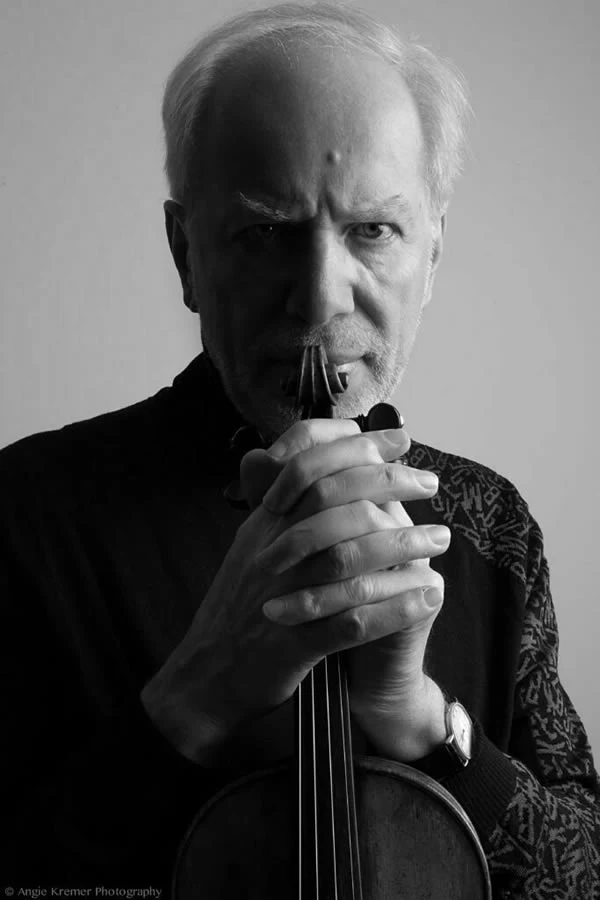Gidon Kremer

Among the world’s leading violinists, Gidon Kremer has perhaps pursued the most unconventional career. He was born on 27 February 1947 in Riga, Latvia, and began studying at the age of four with his father and grandfather, both distinguished string players. At the age of seven, he enrolled as a student at Riga Music School where he made rapid progress, and at sixteen he was awarded the First Prize of the Latvian Republic. Two years later he began his studies with David Oistrakh at the Moscow Conservatory. Gidon Kremer went on to win a series of prestigious awards, including prizes in the 1967 Queen Elisabeth Competition in Brussels and 1969 Montreal International Music Competition and first prize in both the 1969 Paganini and 1970 Tchaikovsky International Competitions.
Over the past five decades he has established and sustained a worldwide reputation as one of the most original and compelling artists of his generation. He has appeared on almost every major concert stage as recitalist and with the most celebrated orchestras of Europe and North America, and has worked with many of the greatest conductors of the past half century.
Gidon Kremer’s repertoire is unusually wide and strikingly varied. It encompasses the full span of classical and romantic masterworks for violin, together with music by such leading twentieth and twenty-first century composers as Berg, Henze and Stockhausen. He has also championed the work of living Russian and Eastern European composers and has performed many important new compositions by them, several of which have been dedicated to him. His name is closely associated with such composers as Alfred Schnittke, Arvo Pärt, Giya Kancheli, Sofia Gubaidulina, Valentin Silvestrov, Luigi Nono, Edison Denisov, Aribert Reimann, Pēteris Vasks, John Adams, Victor Kissine, Michael Nyman, Philip Glass, Leonid Desyatnikov and Astor Piazzolla, whose works he performs in ways that respect tradition while being fully alive to their freshness and originality. It is fair to say that no other soloist of comparable international stature has done more to promote the cause of contemporary composers and new music for violin.
An exceptionally prolific recording artist, Gidon Kremer has made over 120 albums. Many of these have received prestigious international awards and prizes in recognition of his exceptional interpretative insights. The artist’s list of awards includes, among many others, the Grand prix du Disque, the Deutscher Schallplattenpreis, the Ernst von Siemens Musikpreis, the Bundesverdienstkreuz, the Premio dell’ Accademia Musicale Chigiana, the Triumph Prize 2000 (Moscow), the Unesco Prize in 2001, the Saeculum Glashütte Original MusikFestspielPreis from Dresden in 2007, the Rolf Schock Prize for the Musical Arts from Stockholm in 2008, the Lifetime Achievement Award of the Istanbul Music Festival in 2010, and the Una Vita Nella Musica – Artur Rubinstein Prize from Venice in 2011. In 2016 Gidon Kremer has received a Praemium Imperiale prize that is widely considered to be the Nobel Prize of music.
In 1997 Maestro Kremer founded Kremerata Baltica chamber orchestra to foster outstanding young musicians from the three Baltic States – Estonia, Latvia and Lithuania. The ensemble and its founder have toured extensively together over the past two decades, appearing at the world’s leading festivals and concert venues. They have also recorded two dozen albums for the Teldec, Nonesuch, Burleske, Deutsche Grammophon and ECM labels.
In February 2002 Gidon Kremer and Kremerata Baltica received the Grammy Award in the “Best Small Ensemble Performance” category for After Mozart on Nonesuch; the album was awarded an ECHO Klassik later that year. Their 2014 release on ECM of works by Mieczysław Weinberg was nominated for a Grammy in 2015.
In 2015 Deutsche Grammophon released New Seasons, comprising Gidon Kremer and Kremerata Baltica’s recording of Philip Glass’s Violin Concerto No 2, The American Four Seasons, and works by Pärt, Kancheli and Shigeru Umebayashi. Their latest album, issued on ECM in October 2015 to mark Giya Kancheli’s 80th birthday year, pairs the Georgian composer’s Chiaroscuro for violin, string orchestra and percussion and Twilight for two violins and string orchestra, with Maestro Kremer and Patricia Kopatchinskaja as soloists. Both titles attracted high critical praise and a substantial international audience within weeks of their release.
To mark the 70th birthday of the violinist, Deutsche Grammophon has issued a limited CD Box in October 2016 – a total of 22 CDs of complete recordings of violin concertos for the label with two extraordinary concept albums by Kremerata Baltica, including the premiere recording of Schnittke’s Concerto for Three, not previously released. ECM New Series marked the occasion with a new album of all Mieczyslaw Weinberg’s chamber symphonies, released in January 2017, recorded together with Kremerata Baltica.
His commitment to the “discovery” of the composer Mieczyslaw Weinberg, for which Kremer has rendered particularly outstanding services in recent years, should also be emphasized. In 2019 and 2021, Deutsche Grammophon and Accentus Music released albums recorded by and with Gidon Kremer with orchestral and chamber music works by Weinberg.
Gidon Kremer plays an instrument made by Nicola Amati in 1641. He is the author of four books, of which the latest is Letters to a Young Pianist (2013). These writings have been translated into many languages and reflect the breadth of his artistic pursuits and aesthetic outlook.







